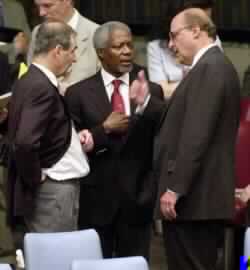HIGHLIGHTS: New Proposal Drops Demand for Automatic Immunity from ICC Jurisdiction Every 12 Months||Members to Send Draft Proposal to their capitals||France Opposes Proposal But Would Abstein Rather than Use Veto Power to Kill it|| STORY: Under attack from its allies, the United States late on Wednesday introduced a new compromise proposal that would exempt its peacekeepers from prosecution by the world's first permanent criminal court for 12 months. (Read photo caption)
The American draft resolution, presented to the 15-nation U.N. Security Council, drops an earlier demand -- rejected by most members -- that immunity from the International Criminal Court's jurisdiction be automatically renewed every 12 months.
Whether the new proposals will be approved is not yet clear after a day of public debate in which dozens of countries flailed the Bush administration for trying to stand above the law. Washington has threatened to kill all U.N. peacekeeping missions if its moves against the court were not approved.
British Ambassador Sir Jeremy Greenstock, this month's council president, said he viewed the draft resolution as "a very fair basis for discussion" and that council members would send it to their capitals.
But France's U.N. ambassador, Jean-David Levitte, told closed council consultations that the resolution was "a step" in the right direction but fell short of getting his country's support, diplomats said. France has threatened an abstention, rather than using its veto power to kill any U.S. proposal.
The United States, Britain, France, Russia and China are permanent council members with veto rights.
The main obstacle, according to many nations, was the sweeping exemption they say misinterprets a 1998 Rome statute creating the court. This allows the Security Council to provide exemptions only on a "case-by-case" basis.
PHOTO CAPTION
U.S. Ambassador to the U.N. John Negroponte, right, speaks to U.N. Secretary-General Kofi Annan, center, prior to an open meeting of Security Council on Bosnia at U.N. headquarters Sunday, June 30, 2002. Jeremy Greenstock, United Kingdom Ambassador, is at left. The United States agreed Sunday to keep the U.N. peacekeeping mission in Bosnia going for three more days, shortly after vetoing a six-month extension because American peacekeepers did not get immunity from the new International Criminal Court. (AP Photo/Osamu Honda)
- Jun 30 8:44 PM
- Author:
& News Agencies - Section:
WORLD HEADLINES


 Home
Home Discover Islam
Discover Islam Quran Recitations
Quran Recitations Lectures
Lectures
 Fatwa
Fatwa Articles
Articles Fiqh
Fiqh E-Books
E-Books Boys & Girls
Boys & Girls  Articles
Articles










